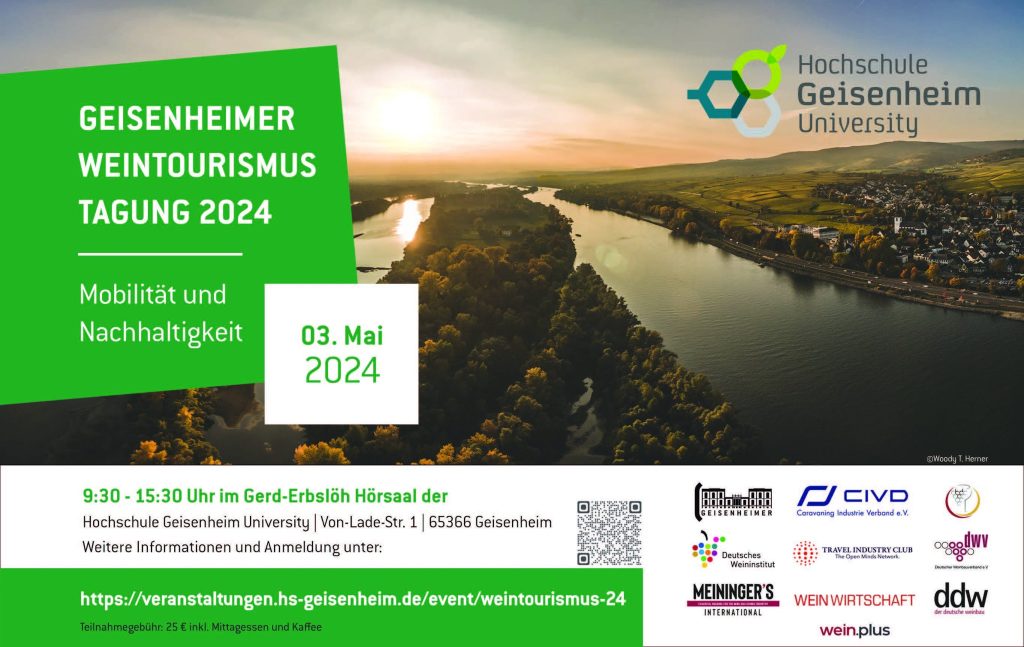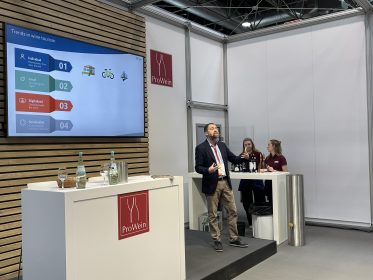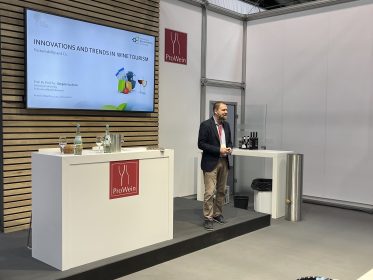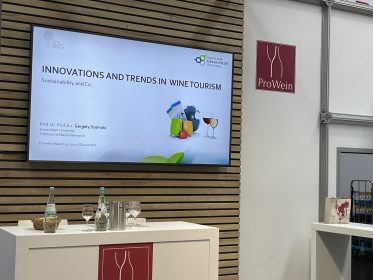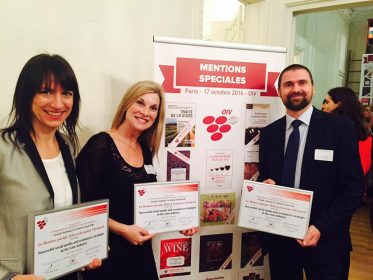Introducing groundbreaking research on innovations and trends in wine tourism, presented for the first time at ProWein 2024
The event of the Wine Travel Awards Team as a part of ProWein 2024 in Düsseldorf Tasting Around the Sustainable World garnered a significant audience due to its intriguing theme of exploring. The event was graced by the presence of an esteemed speaker, Prof. Dr. Prof. h.c. Gergely Szolnoki from Geisenheim University, who also happens to be a member of the WTA jury. Mr Szolnoki shared his invaluable insights and practical recommendations based on a comprehensive study of over 1,500 wineries across 42 countries, making the event a truly exclusive experience.

The event was a resounding success and sold-out. The anticipation was not only due to the informative presentation but also the wine tasting session that followed. The WTA award team had curated an impressive line-up of participants, each representing some of the finest gems from the world of wine. But now, let’s delve into the theoretical aperitif that was served at the event and to all of these unique data which the professor provided us as a part of its huge research for the publication.
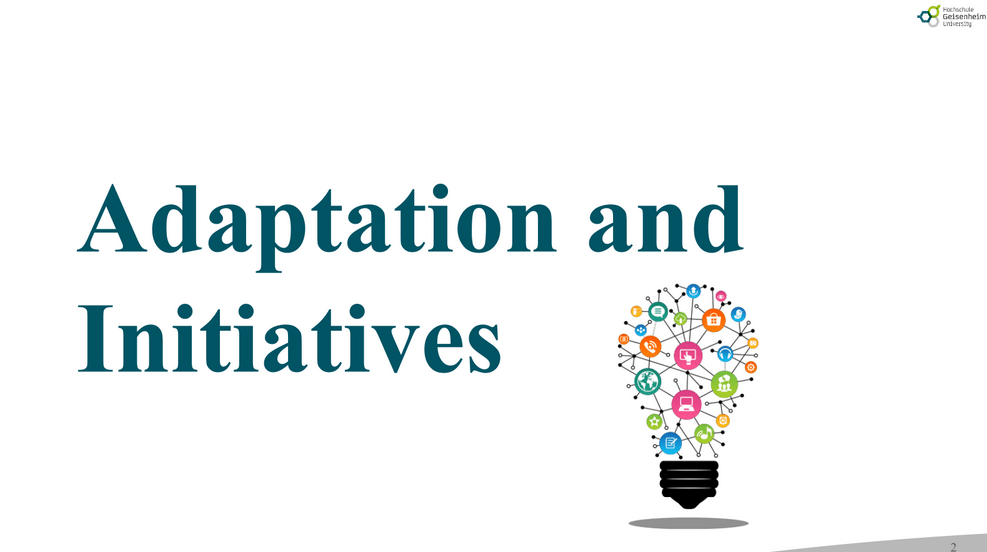
So according to Prof. Dr. Prof. h.c. Gergely Szolnoki Wine tourism is a significant contributor to the global economy, generating an annual revenue of €5 billion and providing employment for approximately 71,000 people.
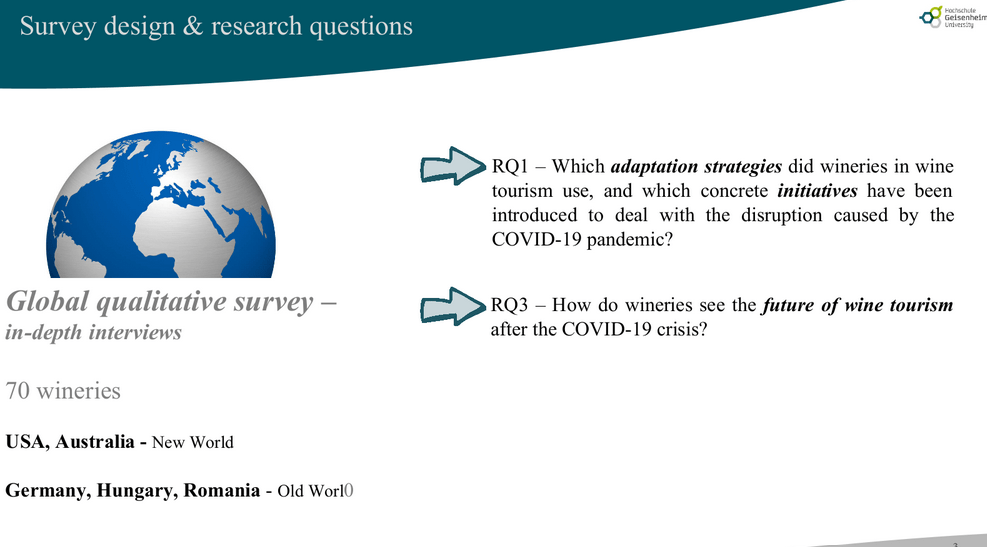
The first and main part is Adaptation strategies & initiatives after the Covid, so the part of the survey was conducted to gain a deeper understanding of the industry. The survey consisted of in-depth interviews with 70 wineries from around the world, including both well-established and emerging wine regions. The wineries were selected from the United States and Australia, representing the New World, and from Germany, Hungary, and Romania, representing the Old World.

The survey aimed to gather insights into the current trends, challenges, and opportunities in the wine tourism industry, as well as to identify best practices and areas for improvement. By analyzing the data collected from the interviews, valuable conclusions were drawn, which can help shape the future of wine tourism and support its sustainable growth.
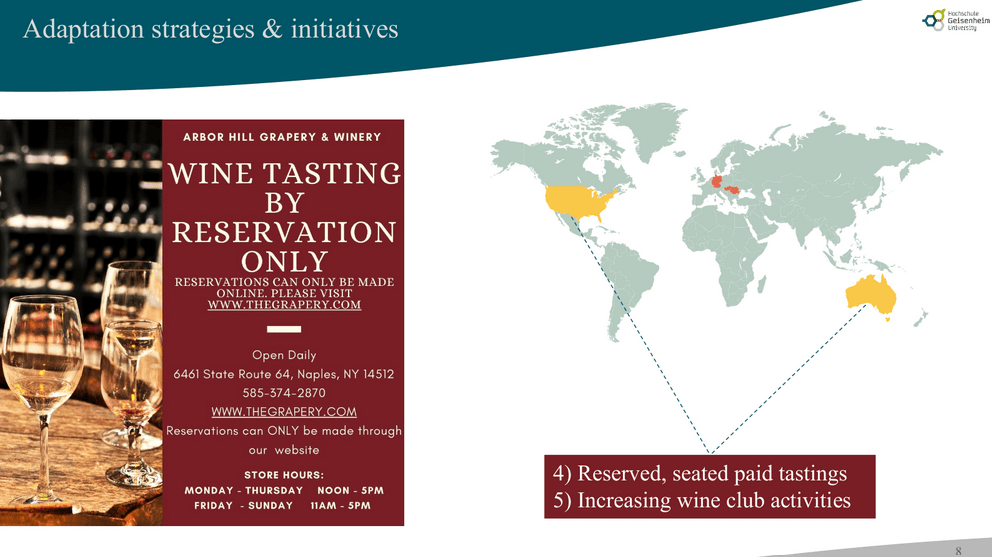
Emerging wine tourism trends shaping its future
And the wine tourism industry is evolving, with several emerging trends shaping its future: Firstly, there is a growing trend towards individualized experiences, moving away from mass tourism.

Travelers are seeking unique and personalized experiences that cater to their specific interests and preferences. Secondly, there is an increasing focus on exploring the local region and its culture. Wine tourism is no longer just about tasting wine but also about discovering the local cuisine, history, and traditions. Thirdly, digitalization is playing an increasingly important role in wine tourism. Travelers are using technology to plan their trips, connect with wineries, and share their experiences on social media.

Finally, sustainability is becoming a key consideration in wine tourism. Travelers are looking for environmentally friendly and socially responsible experiences that support the local economy and community. Wineries are also adopting sustainable practices in response to growing consumer demand and to ensure the long-term viability of their businesses.

The key findings regarding the role of sustainability in wine tourism
The survey revealed several key findings regarding the role of sustainability in wine tourism.

- Sustainability is of critical importance to wineries, with many incorporating sustainable practices into their operations.
- Wineries have varying perspectives on the overlap between sustainable wine production and sustainable wine tourism. However, the overall overlap appears to be relatively small.
- Tthe survey found that wineries place slightly more importance on the environmental dimension of sustainability compared to the economic and social aspects.
- The most important measures that wineries plan to implement include careful energy use, developing a long-term company strategy, and collaborating with regional companies and actors.

The survey revealed that 62% of wineries believe that sustainable practices in wine tourism are currently essential for visitors. However, this number is expected to rise significantly in the next five years, with 87% of wineries predicting that sustainable practices will become much more important to visitors.

93% of surveyed wineries emphasized the importance of sustainability in wine tourism, with Chile rating it the highest at 4.8 out of 5, surpassing Germany and Hungary by a significant margin.
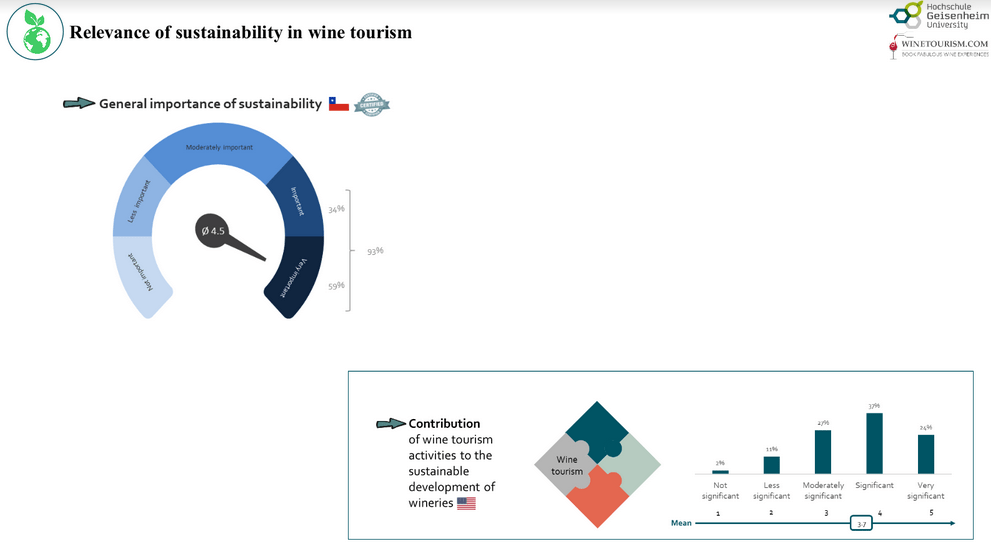
Respondents highlighted the environment as the foremost pillar of sustainable wine tourism, with 40% of responses. The social and economic pillars were rated similarly, each receiving 29% and 31% of responses, respectively.
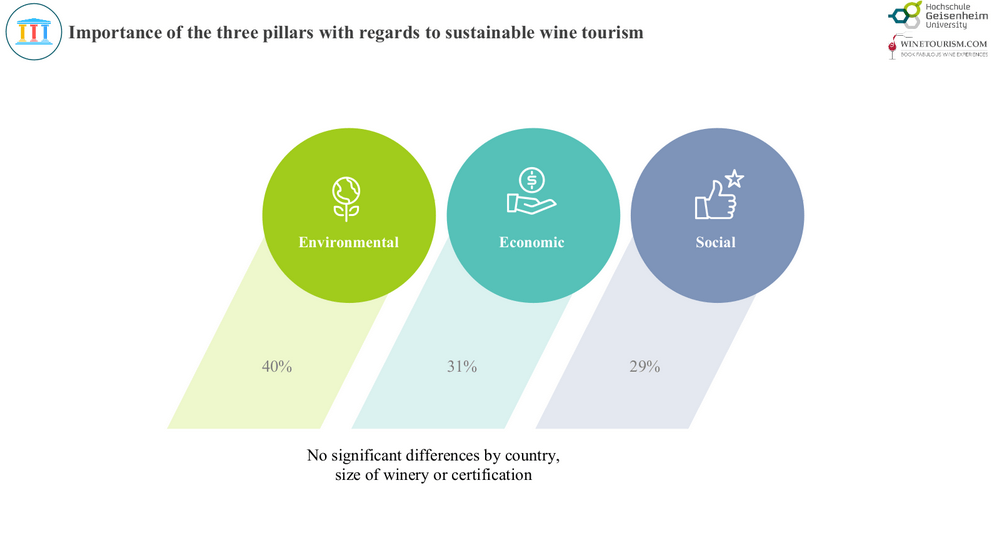
Drivers and barriers to sustainable wine tourism. As well as important pillars
According to the survey, the primary drivers for sustainable wine tourism include building trust and reputation (57%), enhancing visitor satisfaction (55%), and contributing to a better world (55%).
Meanwhile, the main barriers to sustainable wine tourism are cited as a lack of financial resources (48%), insufficient human resources (35%), and inadequate infrastructure (35%).
In sustainable wine tourism, the three pillars hold varying degrees of importance: the environmental aspect ranks highest at 40%, followed by the economic pillar at 31%, and the social dimension at 29%.
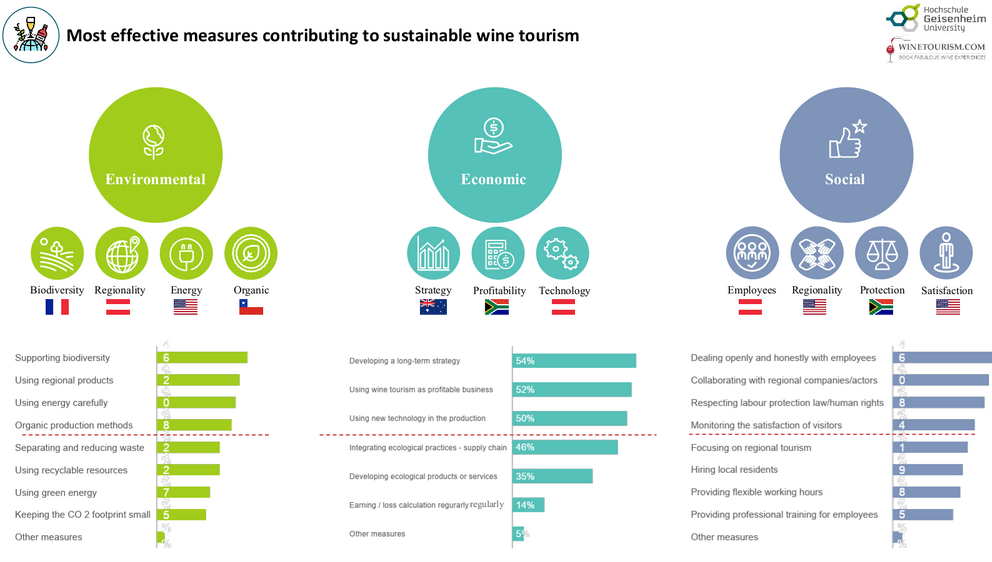
Visitors & wine tourism
Visitor perception of sustainable wine tourism practices is a crucial factor in the success of sustainable initiatives in the wine tourism industry. According the survey, visitors’ attitudes towards sustainable wine tourism have been shifting towards greater importance.
Currently, 62% of visitors perceive sustainable wine tourism practices as important, while 38% do not consider them important. However, looking ahead to the next five years, there is a significant increase in the perceived importance of sustainable wine tourism practices, with 82% of visitors considering them important and only 13% not considering them important.

This shift in perception reflects a growing awareness and understanding among visitors of the importance of sustainability in the wine tourism industry. Visitors are increasingly seeking sustainable experiences that align with their values and contribute to the preservation of the environment and local communities.
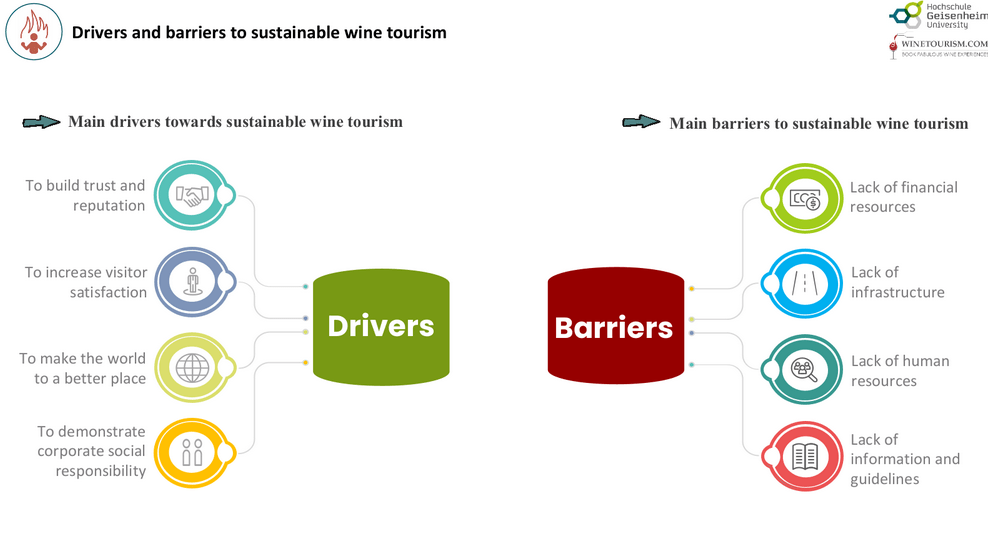
Wineries can capitalize on this trend by adopting sustainable practices and communicating them effectively to visitors. By doing so, wineries can not only meet visitors’ expectations but also enhance their reputation and competitiveness in the global market. However, it is essential to ensure that sustainability initiatives are genuine and meaningful, rather than simply a marketing tool, to avoid greenwashing and maintain visitors’ trust and loyalty.
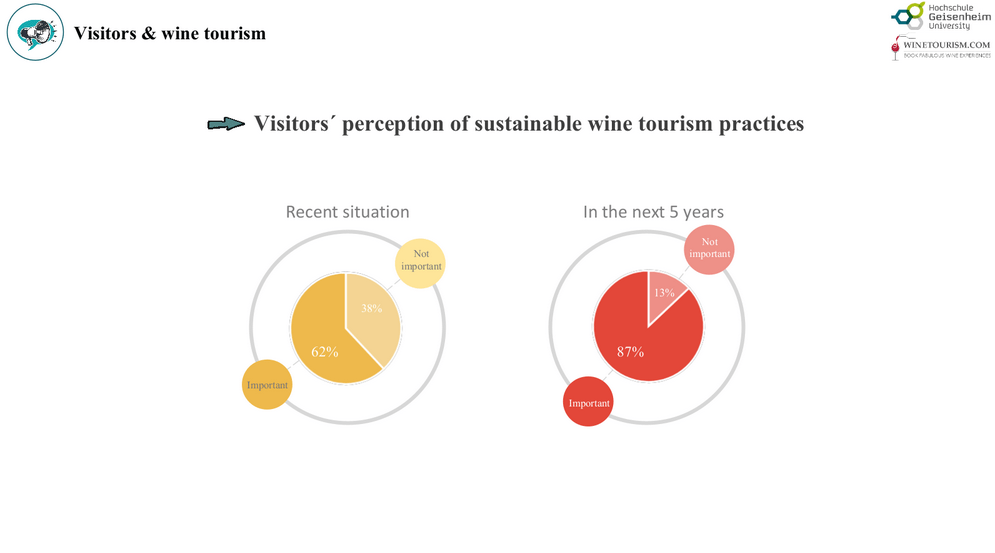
The Conclusions
In conclusion, sustainability and sustainable wine tourism are of paramount importance, although defining and implementing measures for sustainable wine tourism can be complex due to a lack of experience.

To address this challenge, a supported measure catalogue with concrete ideas could facilitate easier adoption. Lack of information and guidelines emerges as one of the main barriers hindering progress in sustainable wine tourism, highlighting the need for accessible resources and clear guidance in this field.

We extend our gratitude to Prof. Dr. Prof. h.c. Gergely Szolnoki for his insightful speech and for generously sharing valuable information with us, which will undoubtedly contribute to the advancement of wine tourism in the future.
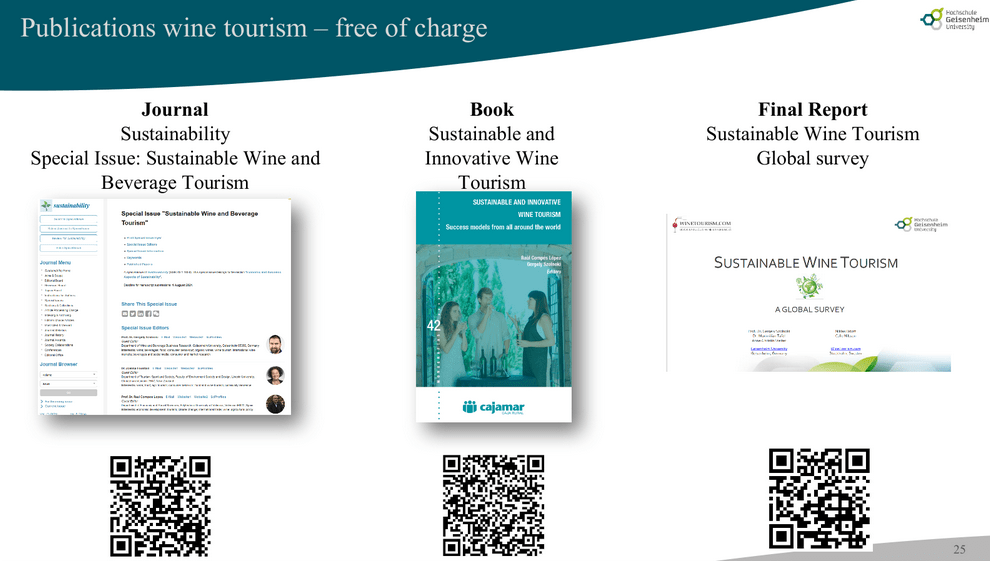
For further details about the study, please refer to the link provided.
Moreover, we are pleased to extend a warm invitation to attend the Geisenheimer Weintourismus Tagung 2024, an insightful and engaging event focused on wine tourism. Prof. Dr. Prof. h.c. Gergely Szolnoki, a distinguished member of the Wine Travel Awards jury, encourages industry professionals, academics, and enthusiasts to join this exceptional gathering.
